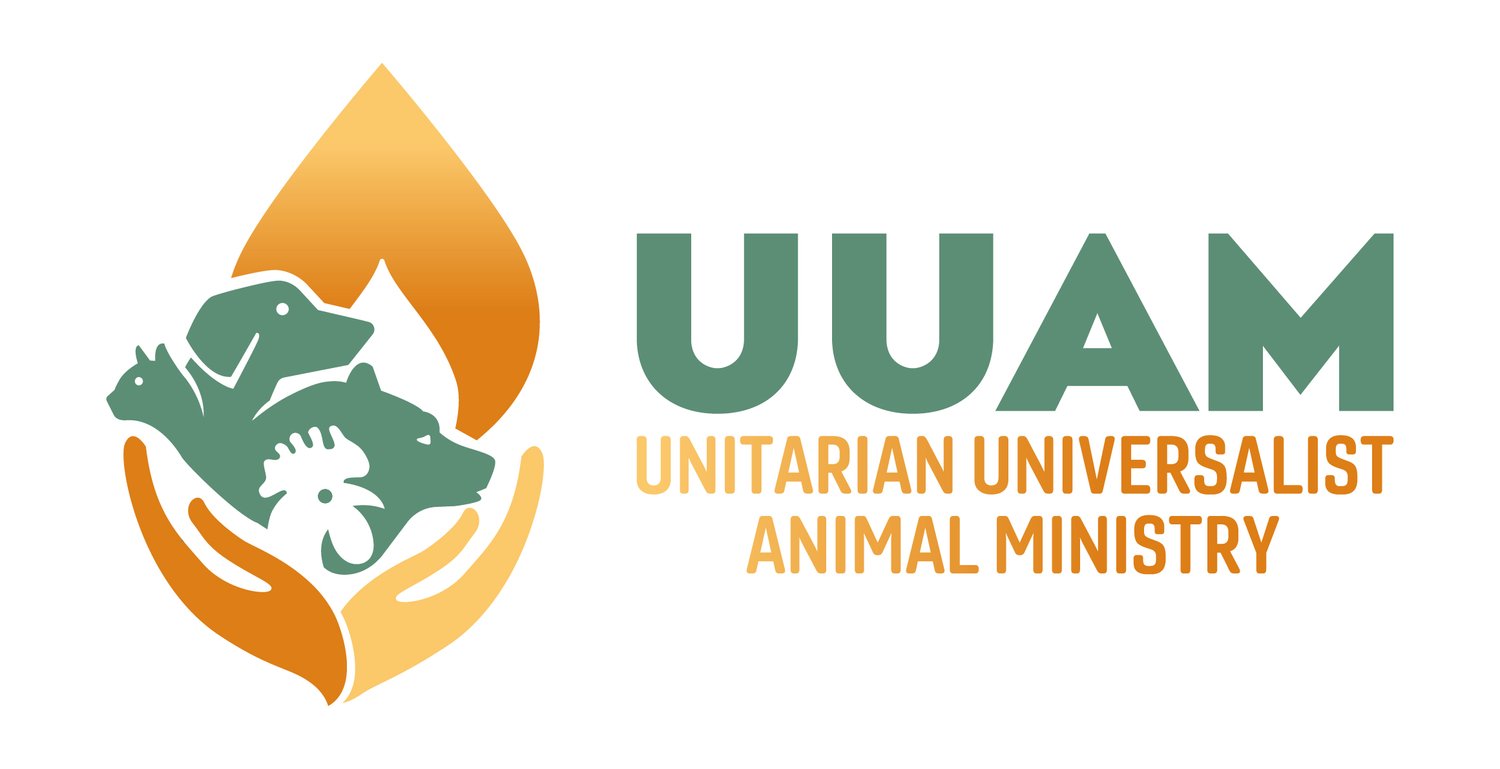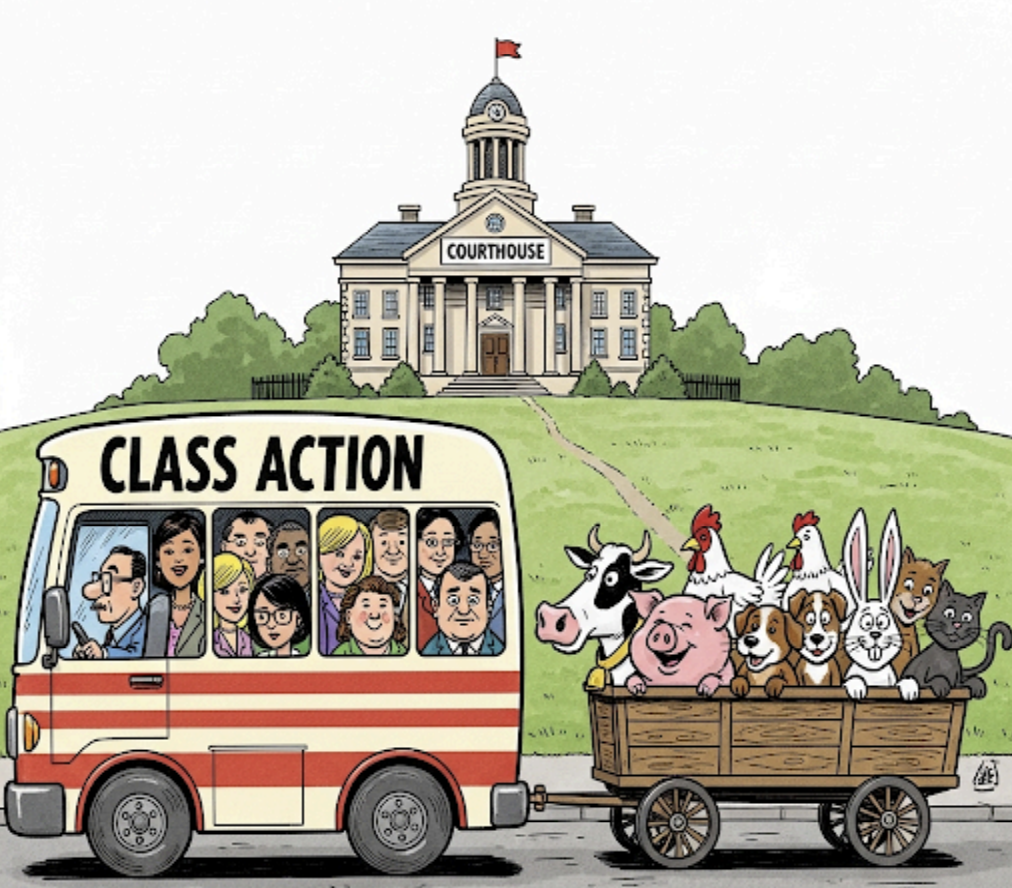How Much Can Class Actions Help Animals?
“Along for the ride” Image by author using GEMINI image creator
Introduction
It’s just not your day! You wake early to your hungrily meowing cat, Bob. Stumbling to the kitchen, you hastily feed him, your sleep mask dangling precariously from one ear and your bedhead a trampled blackberry thicket. Minutes later, as Bob licks his happy lips and you hesitantly sip your morning coffee — a sludge-forward blend your barista somehow talked you into buying — you read in the paper that the maker of Bob’s food just recalled it for contamination the company knew about for years. Groggily absorbing this news — but not yet telling Bob — you shuffle to your bathroom to apply “WrinkleNot,” an expensive facial product, labeled as “cruelty free” and “age-defying,” only to hear from a radio host that animal activists have discovered it was actually tested on rabbits — and made their faces wrinkle!
You care about Bob and rabbits — not to mention your face — and feel outraged. So, you ask your lawyer sister whether you have claims against the companies. She says perhaps, but cautions that litigation entails substantial expenses, a lengthy commitment and no assured victory. She urges you to first check for existing class actions against the companies.
Class actions often grab headlines: recall the massive Equifax data breach, Facebook's improper data sharing, Visa's unlawful charges, and the Purdue Pharma opioid scheme. Although animals were not victims in these cases, class actions often arise in contexts where they are the underlying victims and could indirectly benefit from such actions. In those contexts, while animals are not — and are not permitted by law to be — plaintiffs, they are, as suggested in the article image above, effectively “along for the ride” with these human class actions. This article examines the potential of class actions to indirectly drive positive change for animals, as well as the challenges class actions face.
What’s a Class Action?
If a country music song were written about class actions, it might be titled “United We Sue.” Class actions begin with a lawsuit filed by one or more named plaintiffs alleging claims against one or more defendants and asking the court to permit the named plaintiffs to also pursue the lawsuit on behalf of a larger group (the class) who have similar claims. For the lawsuit to proceed as a class action, the court must approve or “certify” it under restrictive statutory rules. Before the court rules on certification, the lawsuit remains a proposed class action. If certified, the lawsuit’s outcome generally binds all class members, but individuals can sometimes opt out of the class. Conversely, if the court denies certification, the named plaintiff or plaintiffs may press forward with their individual claims—an option often costly, daunting and quixotic.
Can animals bring class actions?
Animals can’t bring class actions or any lawsuit for that matter because, according to the law’s morally-blinkered logic, they are property, like a “washing machine or coffee table,” and property lacks legal rights. This means that damages in class actions of the type that indirectly benefit animals, whether awarded by a court or received in a settlement, go to the human consumer plaintiffs, and not to or for the direct benefit of animals whose harm underlies those claims. Moreover, with some exceptions, any injunctive relief awarded by a court in these class actions doesn’t prohibit such harm to animals, but instead only prohibits, for example, humanewashing or the sale of defective products.
What are typical examples of class actions that indirectly benefit animals?
To better understand how some class actions indirectly benefit animals, it’s helpful to first note the types of class actions that typically confer those benefits. They’re generally consumer cases, which fall into one of two main categories: non-companion animals and companion animals.
Non-companion Class Actions
Non-companion class actions indirectly benefiting animals typically target “humanewashing”: deceptive marketing tactics that companies, particularly within the animal agriculture and food industries, use to create the false impression that their products adhere to high animal welfare standards. These practices cynically exploit consumers' desire to make compassionate, informed choices and mislead consumers into buying products or services they normally shun or overpaying for them. Picture humanewashing as animal horror stories disguised as Disney fairy tales, allowing companies to profit twice: first by cutting costs through poor welfare, and then by charging premiums for allegedly humane products. Typical examples include:
● Food Labeling Deceptions: Companies, allegedly including Hormel, Fairlife, Perdue Farms, Alexandre Family Farms, and Trader Joe’s, mislead consumers with vague claims (“humane,” “organic,” “free-range,” “ethically raised”) and idyllic imagery masking intensive confinement and poor animal treatment.
● Animal Testing Misrepresentations: Businesses, like the fictional maker of WrinkleNot above, falsely claim they don’t test on animals.
● Animal Entertainment Deceptions: Zoos, circuses and marine parks depict animals as happy and well-treated despite exploitative practices.
Companion-animal Class Actions
Common examples of companion-animal-related class actions indirectly benefiting animals arise from the following:
● Puppy Mill Misrepresentations: Pet stores (allegedly including Petland) and breeders sell unhealthy pets while misrepresenting their health.
● Pet Product Defects: Companies sell defective pet foods, treats, toys or medications.
How do animals indirectly benefit from these class actions?
Animals indirectly benefit from class actions in at least the following ways:
● Legal Access Empowerment: Due to the expense, time commitment, and uncertain outcome, many lawsuits potentially benefiting animals wouldn’t be brought at all if they couldn’t be pursued as class actions.
● Financial Payment Deterrence: Class actions threaten defendant companies with substantial payments under court awards or settlements, potentially deterring them from the underlying misconduct that harms animals.
● Advertising Practices Injunctions: Class actions can result in injunctions and settlements that prohibit deceptive advertising practices which might lead a defendant to adopt better animal treatment and honest competitors to fare better in the market.
● Animal Welfare Mandates: Settlements can require more ethical animal treatment, even when a court might not have granted that relief in a court judgment; in some cases, courts enjoin animal mistreatment that violates specific legal standards.
● Corporate Reputation Protection: Public scrutiny from class actions discourages corporate misconduct relating to animals.
● Industry Conduct Reform: As an industry-wide wake-up call, class actions can pressure other competitors to adopt genuinely humane practices or eliminate humanewashing.
● Labeling Accuracy Assurance: Class actions help consumers receive accurate information about animal welfare.
● Market Fairness Promotion: For honest competitors who incur additional expenses to provide their animals higher welfare conditions, class actions help to establish a fairer market environment.
● Consumer Welfare Campaigns: These actions raise awareness about humanewashing and animal mistreatment.
● Regulatory Oversight Triggers: Heightened government oversight of companies and industries may be sparked by class actions.
● Legislative Policy Triggers: Class actions can inspire new laws addressing humanewashing and animal treatment.
● Cy Pres Awards: Certain class action settlements can include a payment, known as a cy pres award, to an animal welfare organization.
What are some challenges for these class actions?
These class actions face many challenges in addition to those mentioned above.
Investigation Demands
The defendants in these class actions generally conceal their misconduct and, when confronted, deny it. Before a class action, an organization like Farm Forward, Animal Legal Defense Fund, Humane World, or PETA must launch an exhaustive, time-consuming and costly forensic investigation about the underlying defendant misconduct. As noted in June’s UUAM newsletter, Farm Forward and its Director of Education, John Millspaugh, who, of course, also serves as UUAM’s Executive Director, conducted a truly remarkable investigation of Alexandre Family Farms (among the largest U.S. “organic” dairy farms) and Certified Humane, a humane certifier giant. Farm Forward’s investigation uncovered widespread animal abuse—captured in video, photos, whistleblower reports, and veterinarian reviews—revealing systemic cruelty such as dehorning without pain relief, applying salt to cow eyes, and selling diseased animals, all while Alexandre retained its Certified Humane certifications. The investigation, highlighted in The Atlantic, prompted a recent proposed class action alleging that both Alexandre Family Farms and Certified Humane knowingly engaged in humanewashing. Kudos to John and Farm Forward!
Certification Hurdles
Unfortunately, courts decline to certify most class actions involving companion animals. And, absent settlement before the certification stage, courts dismiss non-companion animal class actions more often than companion animal ones. Obviously, certified class actions generally prove more beneficial to animals than proposed class actions. Nevertheless, even uncertified or rejected class actions often deliver many benefits to animals.
Trial-stage Battles
While certification greatly enhances settlement leverage, it falls short of guaranteeing victory on underlying humane-washing or defective-product claims. Absent a settlement, plaintiffs must still prove those claims, which may seem straightforward but generally is very challenging, even with compelling evidence of animal mistreatment. Defendants, typically well-resourced and represented by large law firms, often wage a litigation war of attrition and take pride in doing so.
Conclusion
While animals suffer far more than humans in situations leading to the class action we’ve discussed, our legal system denies them a direct right to bring class actions or other legal actions. Fortunately, human class actions often significantly, although indirectly, improve animal welfare. Thanks to organizations like Farm Forward for pursuing these actions.
Frank Brown, member UU of Arlington, VA
Additional Reading

